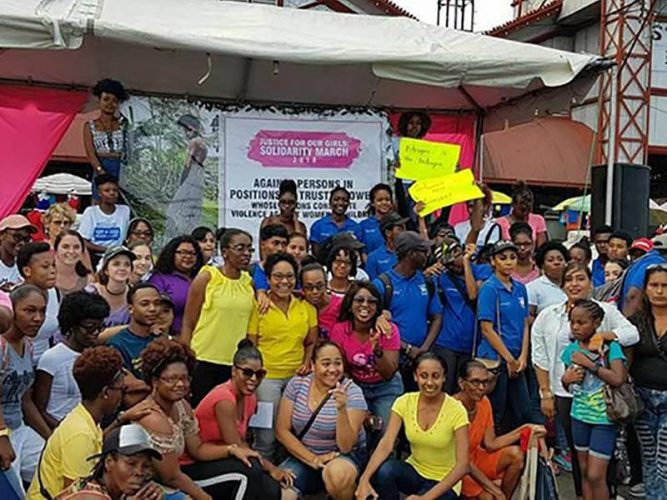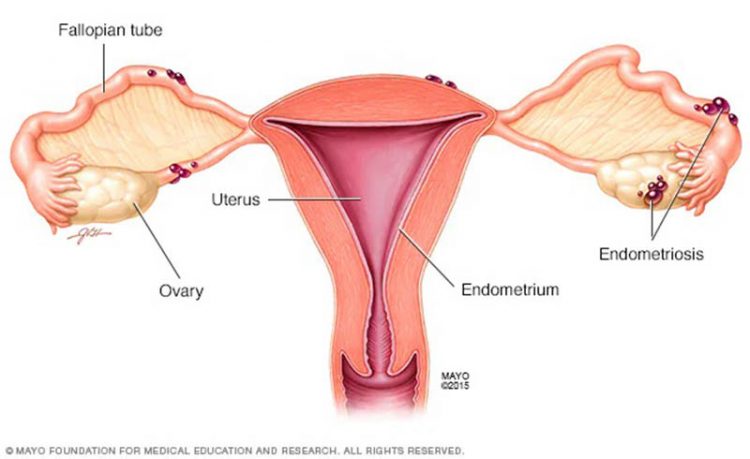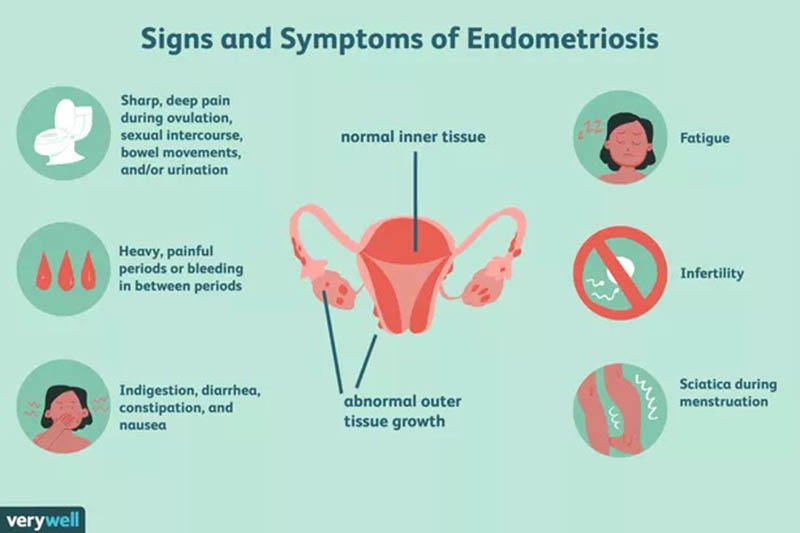As a teenager Lady Eve (not her real name) had such painful periods that she rolled on the floor and the flow was so heavy that she was period shamed countless times by her schoolmates. Even as she got older the menstrual shaming continued and the memories remain. It was not until she was able to save money and visit a gynaecologist at the age of 24 that she found out she has endometriosis.
Mandy (not her real name) also had similar experiences, but she was diagnosed at the age of 18 and she recalled the doctor bluntly telling her that she needed to have a child before she had to “remove everything” (meaning her uterus) in surgery. Mandy protested as she did not even have a boyfriend. She was then given the option of being placed on contraceptives.

According to the Mayo Clinic website, endometriosis (en-doe-me-tree-O-sis) is an often-painful disorder in which tissue similar to that which normally lines the inside of the uterus — the endometrium — grows outside the uterus. Endometriosis most commonly involves the ovaries, fallopian tubes and the tissue lining the pelvis. Rarely, endometrial-like tissue may be found beyond the area where pelvic organs are located. Endometriosis can cause pain — sometimes severe — especially during menstrual periods. Fertility problems also may develop. The severity of the pain may not be a reliable indicator of the extent of the condition. For example, someone could have mild endometriosis with severe pain, or advanced endometriosis with little or no pain.

It was because of their experiences and how even today they continue to suffer that Lady Eve, Mandy and formed themselves into a group called ‘Endo Warriors’ through which they educate the public about the condition and support each other as well as other sisters. They use Facebook and other forums to do this, especially in March, which is the month designated to raise awareness about the condition.
They are part of the Sexual and Reproductive Health and Rights (SRHR) Adventures, a grassroots organisation that seeks to promote sexual and reproductive health and rights with special focus on family planning/contraception in Guyana, which was founded by Dr Patrice Douglas.
Through SRHR Adventures, they seek to peel away the stigma attached to the condition and while they are warriors in their own right, were battered and bruised but live to fight again, the women are not prepared to reveal their identities.
Dr Sara Scott, who is one of the medical volunteers attached to SRHR Adventurers, even though she is not affected by the condition, said she is often very sad when she hears the experiences of the women with medical professionals.
“As a doctor and as a SRHR advocate there is something different we can do with persons who would come with suspected endometriosis or even painful periods because everyone is not the same. Everyone does not have the same tolerance and if you don’t take the time to sit and talk to your patient they can turn to alternative treatment and don’t know how it would affect them,” she said.
She pointed out that pain management is always a challenge for affected women, and they may have to revisit what they are using but must ensure that it is an acceptable dose and that the benefits outweigh the risk. As a medical doctor she believes that there can be more “tact and humanity” when addressing the issue of fertility and it is important to know where the patient is in her life and journey with the condition, before advising her on the next move. Advising a woman right away that she needs to have a child immediately, is not the route to take, she cautioned.
Being a part of SRHR Adventures has influenced how Dr Scott, a family doctor, practices medicine; how she listens and interacts with her patients. She said women’s health is important to her as she has had positive and negative experiences in terms of how women are treated by medical practitioners and as a result she has tried to model herself after the positive experiences. As a volunteer, she has also heard things she will not hear in a doctor’s office. So, when she sits with a patient in her practice, she uses the warriors as teaching points.
She noted that issues with fertility weigh on the minds of women and can affect their mental health, because society has taught them that if they don’t have a regular period or can’t have children, they are not “real” women. Some will be more interested in “fixing” or “getting it back to how it supposed to be” and it has to be explained that it is not like clockwork. “I may not be an endo warrior but I kinda understand the issues that they face when they have to seek medical help in the system,” she said.
Mandy explained that in her community she was told it was normal to have pain during one’s period and once she got married it would go away and it was normal for a young woman to visit a “ladies’ doctor”. SRHR Adventures has become a platform for her to be able to talk about the condition and reproductive health as a whole as passionately as she needed to do it personally,00 without making it personal.
Lady Eve encourages young women to talk to someone if they are having similar experiences and if they feel they need more then talk to others specifically someone in the health arena. There are also other volunteer groups that provide SRHR services for free which they can tap into.
“Do know that periods to the point where it makes you so uncomfortable and it is affecting you day in night in and you can’t go about as a young person as a teenager, that is not normal. If your back feels like it is opening and you are shivering, vomiting…two days on three days that’s not normal,” she advised.
She noted that there is some discomfort during the menstrual cycle, but they should look out for when it is more than they can bear.
She said while she wanted to speak out on the condition she was not ready to do so because of the stigma and discrimination attached and that was when she joined SRHR Adventurers to observe Endometriosis Month every March so that people can become aware. She has been on that journey for five years and she tries to push period health, women’s health and has incorporated patrons in the fight. She said that while the condition affects a woman’s fertility it does not make a woman infertile, it is just a changed lifestyle. She is always on the alert and when she believes the experience is not normal she advises the woman to see a doctor or puts her in touch with one.
Normal pain
Lady Eve recalled that she began menstruating quite late compared to her schoolmates and immediately it was very painful, but she was told it was normal.
She was told to take Panadol for the pain but over the years it got worse. “And when I say worse I mean I would get cold sweat, vomiting, diarrhoea. I would be crying for days like into three days. I know people say like the first day is bad but my first day was only like a start-up…and by the second day is the full swing and I would overflow,” she recalled.
When the overflow happened at school, she was once accused by her peers of having had an abortion. They laughed and mocked her and many times she wanted to cry. She lived within walking distance of the school and would go home to change. When cell phones became a thing, she would call her father to come and get her with his bicycle.
She spent many days during her menstrual cycle with her head on her desk in pain; if not she took the painkillers by which time one Panadol was not strong enough.
“I would overdose and when I say overdose I would constantly take six Panadols and I would be using it just to ease the pain and get through the day,” she recalled.
“I have two other sisters and none of them would cry and when I say cry I telling you there is so much pain, I would sometimes cry myself to sleep and cry during my sleep because Panadol was not enough anymore,” she recalled.
Even her sisters period shamed her by calling her the sickly or referring to her as the ‘granny’ because she walked around almost doubled over.
Over the years she was taken to the doctor maybe one a year and she was told the pain was normal and she should exercise, put a warm cloth on her tummy or try herbal remedies which were employed by her mother countless times.
By the time she started working at the age of 17, a doctor told her she had bacterial vaginosis, but Lady Eve said she was informed enough to know that was not the case. She had moved on to stronger pills and her father learnt their names. Once she recalled she was convulsing on the floor in pain and she showed him one finger and he immediately called the name of the pill and said it was coming up.
Lady Eve took about four pills at a time to ensure that she was able to work through the day until her boss, a woman, noticed something was wrong and asked about it. It later became normal for her to take a sick day every month. It was also normal for her to always have painkillers in her bag and Andrews Liver Salts for the upset stomach from which she suffered during her period. Sprite soda or flavoured water also became part of her diet during this time.
She also told at the age of 20 by a doctor that not only was the pain normal, but it would go away when she had her first child. Some of her family had also mentioned the first child theory, which to her sounded like peer pressure.
Lady Eve said she became more informed and she realised that the pain was not normal. She was able to use her savings to see a gynaecologist for the first time, as the other doctors she had seen were general practitioners. She recalled that over the years, she had fainted in doctors’ offices and none of them requested an ultrasound until she visited the gynaecologist. That revealed that a cyst had grown on one of her ovaries, increasing the painful experience. She needed an emergency surgery. The doctor suspected it was endometriosis and a blood test was done which showed an elevated level of estrogen. Three days after the surgery she menstruated the pain was back as before.
She was put on contraceptives to stop the period for nine months as she could no longer endure the pain. In addition, the amount of painkillers she had used over the years was not healthy. The pain was less after she came off the contraceptives, but it gradually returned. However, over the years, she had started experimenting other treatment options including yoga and she also changed her diet.
“It really hit home when the doctor said you need to have surgery and your fertility maybe at risk and you have to consider having a child, all of this in one day, one breath. Me being 24, sitting processing what is being told to me for the first time… it was like peer pressure,” she recalled.
She shared that it took a lot of composure to get up and figure out how she was getting money for the surgery and for the first time in a while she actually thought about having a husband, as it was not at the table at the time.
“I came out of that room. I found a spot and I cried. I cried because I felt neglected, because for so many years this being my experience from 13 and I had to wait until I could afford to see a gynaecologist. It was overlooked for so long and it led to me losing part of my reproductive system as a young woman and you know I really felt traumatized from all the period shaming over the years. But it was the fact that it took so long for a diagnosis that really shifted my outlook as a woman,” she said candidly.
‘Down low’
Mandy said that they keep their stories on the “down low” and some of members of the groups don’t even know they have the condition.
She said she became a warrior due to Lady Eve’s passion and while in her home she is comfortable about the condition, in her community no one knows.
“Because I have personally seen someone with a simple ovarian cyst, I have seen how my community responded to her. An unmarried girl in her very late teens… and I saw the way my community responded to her and how they treated her, the names they called her and how they talked about her behind her back,” she said.
Witnessing this drove fear into her to the point of not having any confidence to talk about the condition until she met Lady Eve who stood up in front of a crowd and spoke about period health.
She recalled during her high school life spending at least one day during her periods in the sick bay of the school and that was when she was allowed as there were times when teachers denied her request to do so.
She was 18 when she found out she had the condition.
“The doctor was like you don’t really have options. What you need to do is to make a baby and then remove everything. I was like, what the hell? I was like, I am 18. I have never even had a boyfriend. What the hell? I need to now find somebody, have a baby and then I need to remove my ovaries and my uterus?” she recalled.
Mandy said at that time she felt the doctor had lost her mind as she considered herself still a child. After she protested the doctor recommended contraceptives until she was ready to have children.
The first contraceptive she used resulted in her body being swollen and the doctor stopped it, telling her told her she would be at risk for this organ failure. She was fearful after that and instead opted for home remedies until she ended up in emergency surgery for a ruptured cyst. Since then she has been on oral contraceptives because she cannot deal with the pain.
“The pressure has still been there for me to go make that baby. But I keep asking with who because there isn’t that who there in the picture yet,” she said. She shared that she has her good and bad days and she may start talking to someone during her good days and when the bad days come, and the questions come, and she shares about her condition in a matter of weeks to a month they disappear. She now uses her endometriosis as a filter.
The condition has also pushed her into another career path as while she had initially eyed medicine, all the reading and information she gathered on the condition depressed her and she believes if she became a medical doctor it would be worse.
She has been employed twice but forced to leave the jobs when she became very ill. She explained that she would become very exhausted but kept pushing to competently perform her job and her body could not physically handle it.
The warriors said they would like to see more support for women who have the condition and it is their hope to create an Endometriosis Foundation so that women suffering with reproductive illnesses and challenges can get the moral support and referral service needed and understand it is a sisterhood. They also envision having men on board to support their partners and daughters. They also want to peel away the shame attached to periods as women should not be ashamed when they are having their menstrual cycles and not have to hide their pads or be mortified when they have an overflow.






